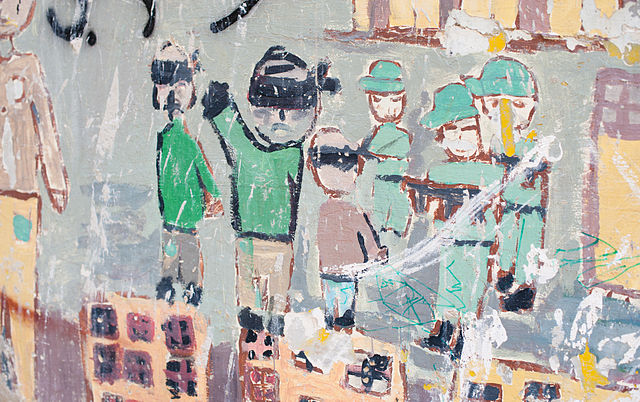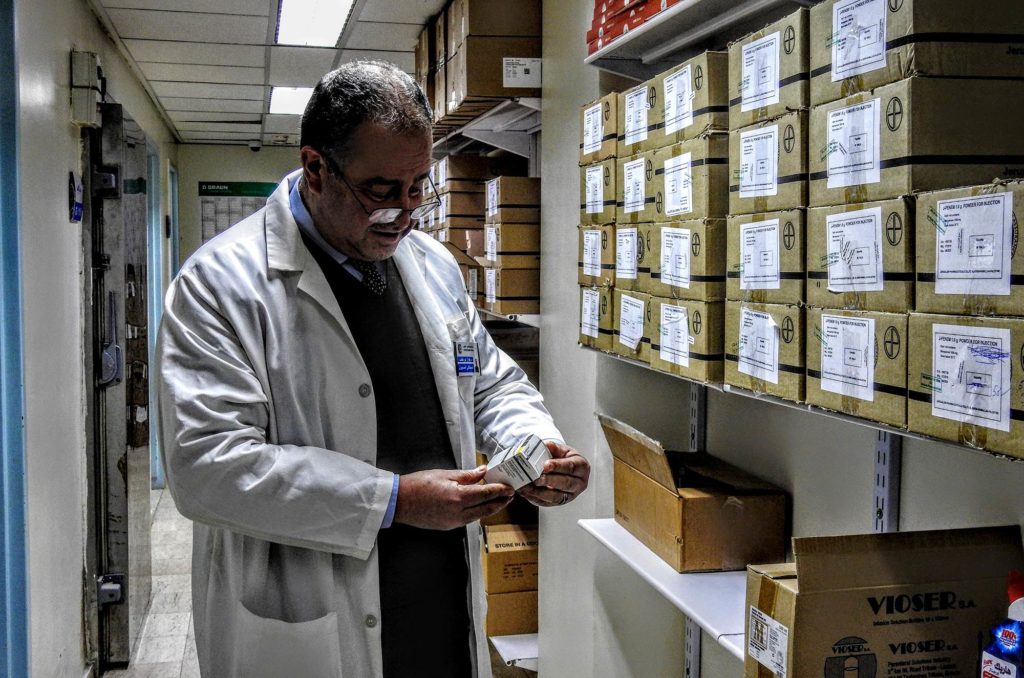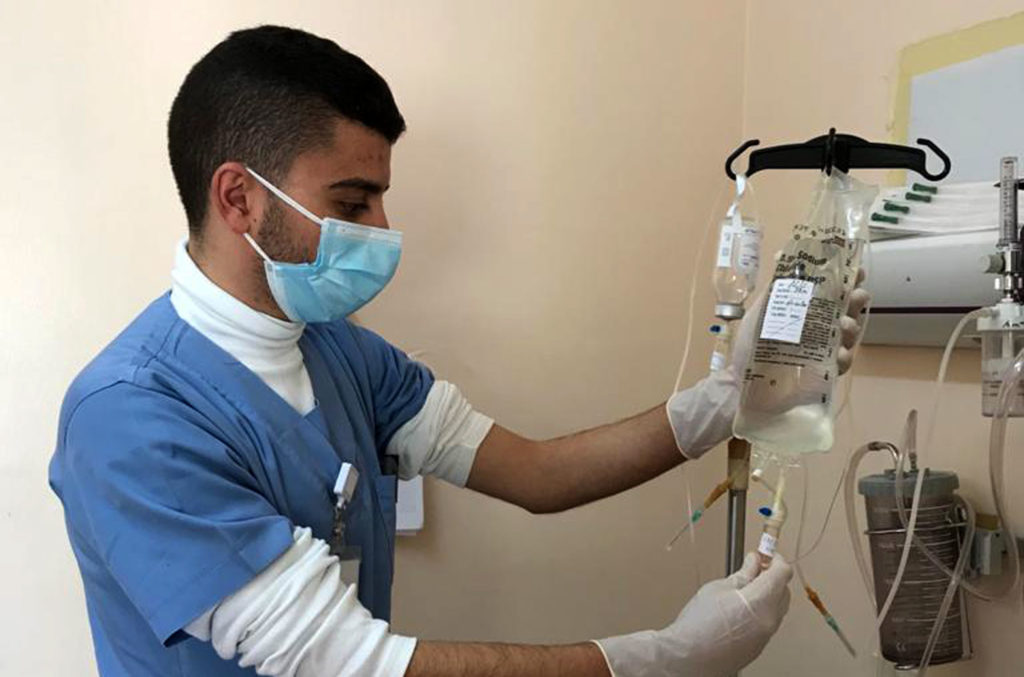Medical Aid Needed Across Palestine During a Time of Crisis and Turmoil
Posted in: Voices from the field
Palestine has been in crisis for the last month. Because Gaza has been at the top of the headlines, people think the needs are only from the war in Gaza. That’s a major focus for sure, but there’s much more.
Since early May, there have been lots of protests and turmoil in the West Bank. One of the big challenges in the last month has been movement. We’ve often been unable to travel from place to place in the West Bank. Israeli settlers gather on roads and in West Bank villages and this leads to situations that impede movement. We’re trying to avoid travel as much as possible. Whenever I need to leave home I must pass through the gate at the front of my village. The Israeli authorities can close it at any time and no one can leave if they do. This is the situation in most towns and villages here. Once through the gate, you have to go on the highway shared with the settlers. One of my relatives was injured the other week when settlers threw stones at his car.


When this latest crisis began, I stayed in Ramallah, close to our main office in the West Bank. I was away from my family for two weeks. Travel back and forth to work would have been impossible so I decided I had to remain in Ramallah. I was trying to help support our Gaza medical donations team, especially since their internet and electricity frequently went down. I handled whatever coordination I could outside of Gaza.
There are no accurate and comprehensive statistics on the injuries sustained in the turmoil of the last month, but just to give some idea, according to the Palestinian Red Crescent Society, health facilities have received some 400 critical cases of injuries, 41 healthcare workers were injured in the West Bank, 21 medical vehicles were damaged or confiscated, and there have been reports of physical attacks and restrictions on the movement of healthcare workers.
Now it’s becoming calmer. However, no one knows what will happen next. Will the ceasefire last? Will things escalate again? We need to be ready for anything.
After the 11-day bombardment, the healthcare system in Gaza has critical shortages. The Ministry of Health has warned of a looming public health crisis in Gaza and the West Bank and called on international nonprofits to help address the situation by supplying medicines and medical supplies. To respond rapidly, we’re procuring what we can for Gaza locally in the West Bank. The challenge with procurement that we’re facing right now is that prices are changing constantly. Suppliers keep raising their rates, sometimes literally every day.


Gaza’s blood bank urgently needs blood bank kits. A rapid-response grant from Americares has made it possible for us to procure 126 kits for the bank, which will allow them to conduct 12,600 blood tests (each kit has materials for 100 blood tests), covering their needs for six months. The value of these is $44,856. We’re also working hard to get medicines that will meet the needs of hospitals and clinics in Gaza.
It’s important to note that, although Gaza and the West Bank are both part of Palestine, and aid shipments go to the same port and are subject to the same policies and logistics, the 15-year blockade imposed on Gaza forces nonprofits like Anera to handle aid shipments to the different Palestinian territories separately. Prices are tripling because shipping and importing into Gaza is so difficult at the moment.
The total value of our Gaza procurement so far, including medicines, medical supplies and blood bank kits, is $125,000. We have sent the purchase order to our suppliers and expect to deliver this medical aid to Gaza within the next week.
The Health System in the West Bank Currently Has Significant Shortages of Medicines and Medical Supplies
In the West Bank too there is huge need. It makes sense to focus on Gaza, of course, given the horrors they have endured, but we must not overlook the shortages in the West Bank. Patients with chronic diseases are in particular need here. We received four shipments in the last month for the West Bank and we’ve been distributing this medical aid to 13 hospitals and clinics across the West Bank since the crisis began. It includes large quantities of medical supplies like 266,000 PPE items. This is really important because COVID remains a grave problem in the West Bank and Gaza. We’ve also received a great quantity of antibiotics. And we’re about to receive a 40-foot container of IV solutions from Americares, plus another one for Gaza.


Al Ahli Hospital in Hebron is a key recipient right now – they’re one of the main treatment centers for all of Palestine, even for Gaza residents, because it’s a referral hospital. After a dispute between the Palestinian Authority and Israeli authorities last year led to a halt in coordination, Al Ahli Hospital became even more important for Palestinian patients who previously received treatment in hospitals in Israel. The staff of Al Ahli even worked without a salary for four months during the second half of last year – until the authorities reached an agreement and the money for the Palestinian Ministry of Health was restored.
On top of all that, last year Al Ahli Hospital immediately created a COVID-19 ward at the onset of the pandemic, which provided a huge boost to the Palestinian healthcare system in the West Bank as it strained to deal with the coronavirus.
Fortunately, we’ve been able to support them through all this. A grant from Direct Relief allowed us to provide them with a huge quantity of medical supplies. Yesterday I made a site visit to Al Ahli and they’re very thankful to have these medical supplies. It’s an amazing procurement — one of the successes I’m proudest of in recent months.
Anera is working to respond to the urgent call for support from the Palestinian Ministry of Health. Fortunately, we will be working even more closely with the Ministry of Health to support additional health clinics across the West Bank and expand our medical donations program here.
In the West Bank, there’s a serious shortage of chronic medicines like anti-diabetics and antihypertensives. These medicines are so needed right now and our clinic partners call me daily asking if there’s anything in the pipeline.
I can give you a personal example. Yesterday, I tried to pick up a medical cream prescribed by the doctor for my son, and I had to visit many pharmacies before I could find it. Now imagine if you have no income and cannot even afford to buy the medicine when you finally find it.


Maintaining the continuity of chronic medications is really important to us. It’s always a major challenge. For instance, we received some really good donations about six months ago that included a new generation of antidiabetic drugs (Type 2). But now that supply has run out, so patients may need to switch back to older classes of drugs unless we can secure another donation. This can be a real problem when patients have to change medicines that they’ve come to trust. And these medications are so expensive at pharmacies that most people can’t afford to buy them.
The background to everything we’ve been confronting in the last month is the pandemic. COVID-19 was a nightmare in the West Bank, especially after the second wave started in March. It was really grim. I wrote a report about it to my colleagues. The system of Palestinian laborers traveling regularly between the West Bank and Israel led to a huge spread of the virus in the West Bank. Thankfully, the situation is finally improving – so much so that the Dura government hospital wing that was designated to deal with COVID-19 yesterday announced that it had zero COVID patients! However, people are still wearing masks since most of us aren’t yet vaccinated.
The vaccination campaign is making some headway. Some 318,000 people have been vaccinated in the West Bank as of today (not including East Jerusalem). The Ministry of Health is offering the vaccine to people over 40 years old. Both the Pfizer and AstraZeneca vaccines are available. At the beginning, people were hesitant and waiting to see if those they knew were vaccinated would have scary side-effects – but now people are gaining confidence in the vaccines. I estimate that 90% of people will take the vaccine once they have the chance. The main limitation on the campaign at this point is the severely limited supply.
Most of our staff have been vaccinated, although not all of us. Of course as Palestinians we face all sorts of unique additional challenges, like the impact that a government-issued vaccination certification might have on travel to other countries in the region where we work. Palestinians might be the only people in the world that could be prevented from entering a country precisely because they have proof of vaccination!
Of course, managing the COVID crisis has been a huge burden on the Palestinian healthcare system as a whole. Al Ahli Hospital, for example, had to set up and equip outdoor tents for COVID intake and they had to provide PPE to patients and visitors. This alone was a big financial burden on them.
So our healthcare partners and the vulnerable communities they serve really need our support. We’re immensely grateful to our medical donations partners and to all of Anera’s donors who support our work to help make quality healthcare available to everyone.
OUR BLOG
Related
In Gaza, systematic bombardment of civilian housing and infrastructure has created a crisis of shelter that is endangering over a million.
The undersigned members of the Association of International Development Agencies (AIDA) urgently call upon the international community to intervene and halt settler attacks targeting Palestinian civilians and protect Palestinian communities near illegal settlements. The International NGO Community urges international actors…

